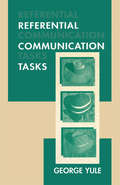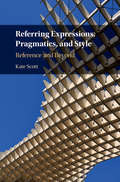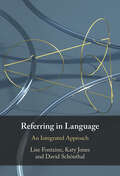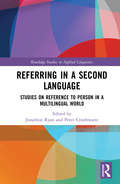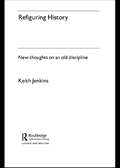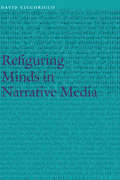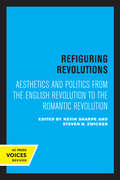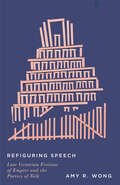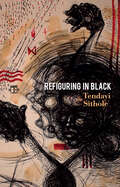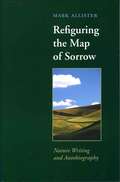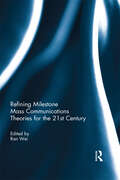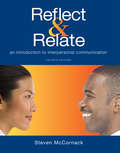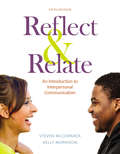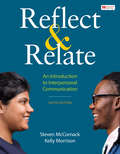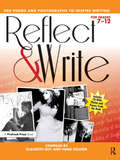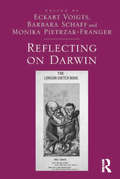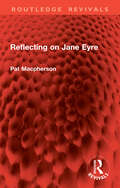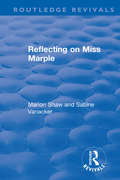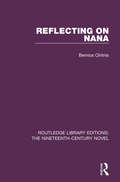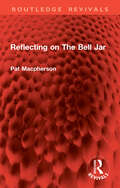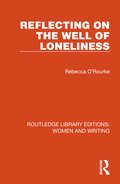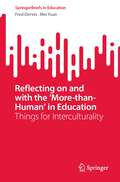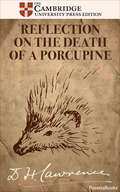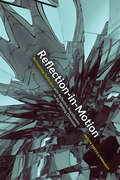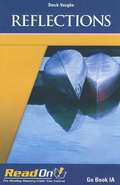- Table View
- List View
Referential Communication Tasks: Referential Communication Tasks (Second Language Acquisition Research Series)
by George YuleReferential communication is the term given to communicative acts, generally spoken, in which some kind of information is exchanged between one speaker and another. This information exchange is typically dependent on successful acts of reference, whereby entities (human and non-human) are identified (by naming or describing), are located or moved relative to other entities (by giving instructions or directions), or are followed through sequences of locations and events (by recounting an incident or a narrative). These "activities" are examples of events that are more typically described as "tasks" in the area of second language studies. These might be real world tasks encountered in everyday experience or pedagogical tasks specifically designed for second language classroom use. This volume comprehensively documents and describes the veritable explosion of task-based research in language acquisition. In a succinct, yet easily accessible fashion, it presents the origins, principles, and key distinctions of referential communication research in first and second language studies, complete with exhaustive analyses and illustrations of different types of materials. The author also describes and evaluates different choices for using or modifying these materials, provides analytic frameworks for focusing on various aspects of the data elicited by these tasks, and includes an extensive bibliography plus an appendix showing original task materials.
Referring Expressions, Pragmatics, and Style: Reference and Beyond
by Kate ScottReference is a major theme in the study of language and language use. Providing a relevance-theoretic account of reference resolution, this book develops our understanding of procedurally encoded meaning by exploring its function and role in reference resolution. A range of referring expressions are discussed, including definite descriptions, demonstratives and pronouns. Existing work on the pragmatics of reference has largely focused on how reference is resolved. However, speakers can do much more than just secure reference when they use a referring expression. A speaker's choice of expression might communicate information about their attitudes and their emotions, and referring expressions can also be used to create stylistic and poetic effects. The analyses in this book widen the focus to consider these broader effects, and the discussions and arguments presented take seriously the idea that referring expressions can contribute to meaning and communication in a way that goes beyond reference.
Referring in Language: An Integrated Approach
by Lise Fontaine David Schönthal Katy JonesReferential expressions include terms such as determiners, proper names, noun phrases, pronouns, and all other expressions that we use to make reference to things, beings, or events. The first of its kind, this book presents a detailed, integrated account of typical and atypical uses of referential expressions, combining insights from discourse, cognitive, and psycholinguistic literature within a functional model of language. It first establishes a foundation for reference, including an overview of key influences in the study of reference, the debates surrounding (in)definiteness, and a functional description of referring expressions. It then draws on a variety of approaches to provide a comprehensive explanation of atypical uses, including referring in an uncollaborative context, indefinite expressions used for definite reference, reference by and for children, and finally metonymic reference with a special focus on metonymy in medical contexts. Comprehensive in scope, it is essential reading for academic researchers in syntax, discourse analysis, and cognitive linguistics.
Referring in a Second Language: Studies on Reference to Person in a Multilingual World (Routledge Studies in Applied Linguistics)
by Jonathon Ryan Peter CrosthwaiteThe introduction and tracking of reference to people or individuals, known as referential movement, is a central feature of coherence, and accounts for “about every third word of discourse”. Located at the intersection of pragmatics and grammar, reference is now proving a rich and enduring source of insight into second language development. The challenge for second language (L2) learners involves navigating the selection and positioning of reference in the target language, continually shifting and balancing the referential means used to maintain coherence, while remaining acutely sensitive to the discourse and social context. The present volume focuses on how L2 learners meet that challenge, bringing together both eminent and up-and-coming researchers in the field of L2 acquisition. The chapters address a range of problems in second language acquisition (SLA) (e.g., form-function mapping, first language [L1] influence, developmental trajectories), and do so in relation to various theoretical approaches to reference (e.g., Accessibility Theory, Givenness Hierarchy). The global outlook of these studies relates to the L2 acquisition of English, French, Japanese, Korean, and Spanish and covers a diverse range of situational contexts including heritage language learning, English as a medium of instruction, and the development of sociolinguistic competence.
Refiguring History: New Thoughts On an Old Discipline
by Keith JenkinsIn this engaging sequel to Rethinking History, Keith Jenkins argues for a re-figuration of historical study. At the core of his survey lies the realization that objective and disinterested histories as well as historical 'truth' are unachievable. The past and questions about the nature of history remain interminably open to new and disobedient approaches.Jenkins reassesses conventional history in a bold fashion. His committed and radical study presents new ways of 'thinking history', a new methodology and philosophy and their impact on historical practice. This volume is written for students and teachers of history, illuminating and changing the core of their discipline.
Refiguring Minds in Narrative Media (Frontiers of Narrative)
by David CiccoriccoHow do writers represent cognition, and what can these representations tell us about how our own minds work? Refiguring Minds in Narrative Media is the first single-author book to explore these questions across media, moving from analyses of literary narratives in print to those found where so much cultural and artistic production occurs today: computer screens.Expanding the domain of literary studies from a focus on representations to the kind of simulations that characterize narratives in digital media, such as those found in interactive, web-based digital fictions and story-driven video games, David Ciccoricco draws on new research in the cognitive sciences to illustrate how the cybernetic and ludic qualities characterizing narratives in new literary media have significant implications for how we understand the workings of actual minds in an increasingly media-saturated culture. Amid continued concern about the impact of digital media on the minds of readers and players today, and the alarming philosophical questions generated by the communion of minds and machines, Ciccoricco provides detailed examples illustrating how stories in virtually any medium can still nourish creative imagination and cultivate critical—and ethical—reflection. Contributing new insights on attention, perception, memory, and emotion, Refiguring Minds in Narrative Media is a book at the forefront of a new wave of media-conscious cognitive literary studies.
Refiguring Revolutions: Aesthetics and Politics from the English Revolution to the Romantic Revolution
by Kevin Sharpe Steven N. ZwickerRefiguring Revolutions presents an original and interdisciplinary reassessment of the cultural and political history of England from 1649 to 1789. Bypassing conventional chronologies and traditional notions of disciplinary divides, editors Kevin Sharpe and Steven Zwicker frame a set of new agendas for, and suggest new approaches to, the study of seventeenth- and eighteenth-century England. Customary periodization by dynasty and century obscures the aesthetic and cultural histories that were enacted between and even by the English Civil Wars and the French Revolution. The authors of the essays in this volume set about returning aesthetics to the center of the master narrative of politics. They focus on topics and moments that illuminate the connection between aesthetic issues of a private or public nature and political culture. Politics between the Puritan Revolution and the Romantic Revolution, these authors argue, was a set of social and aesthetic practices, a narrative of presentations, exchanges, and performances as much as it was a story of monarchies and ministries. This title is part of UC Press's Voices Revived program, which commemorates University of California Press’s mission to seek out and cultivate the brightest minds and give them voice, reach, and impact. Drawing on a backlist dating to 1893, Voices Revived makes high-quality, peer-reviewed scholarship accessible once again using print-on-demand technology. This title was originally published in 1998.
Refiguring Speech: Late Victorian Fictions of Empire and the Poetics of Talk
by Amy R. WongIn this book, Amy R. Wong unravels the colonial and racial logic behind seemingly innocuous assumptions about "speech": that our words belong to us, and that self-possession is a virtue. Through readings of late-Victorian fictions of empire, Wong revisits the scene of speech's ideological foreclosures as articulated in postcolonial theory. Engaging Afro-Caribbean thinkers like Édouard Glissant and Sylvia Wynter, Refiguring Speech reroutes attention away from speech and toward an anticolonial poetics of talk, which emphasizes communal ownership and embeddedness within the social world and material environment. Analyzing novels by Robert Louis Stevenson, Bram Stoker, George Meredith, Joseph Conrad, and Ford Madox Ford, Wong refashions the aesthetics of disordered speech—such as parroting, eavesdropping, profuse inarticulacy, and dysfluency—into alternate forms of communication that stand on their own as talk. Wong demonstrates how late nineteenth-century Britain's twin crises of territorialization—of empire and of new media—spurred narrative interests in capturing the sense that speech's tethering to particular persons was no longer tenable. In doing so, Wong connects this period to US empire by constructing a genealogy of Anglo-American speech's colonialist and racialized terms of proprietorship. Refiguring Speech offers students and scholars of Victorian literature and postcolonial studies a powerful conceptualization of talk as an insurgent form of communication.
Refiguring in Black
by Tendayi SitholeRefiguring in Black is a meditation on black life, and a meditation on the questions and concerns with which black life is confronted. It takes the form of a critical engagement with the thought of Frederick Douglass, Toni Morrison, Hortense Spillers, and Charles Mingus – key figures in the black radical tradition. Sithole does not reduce these thinkers to biographical subjects but examines them as figures of black thought in ways that are creative and generative. Erudite and passionate, this book is a statement of and testimony to refiguring as a form of critical practice by those who are engaged in a radical refusal, and thus part of the long arc of the black radical tradition. As a way of understanding the contemporary moment and unmasking antiblackness in all its forms and guises, Sithole’s work brings the annals of black thought into being in order to think differently and necessitate rupture, refusing to concede to the order of things and refusing to be complicit in the dehumanization that has marked the black condition.
Refiguring the Map of Sorrow: Nature Writing and Autobiography (Under the Sign of Nature: Explorations in Ecocriticism)
by Mark AllisterRecent decades have witnessed an explosion of interest in both autobiography and environmental literature. In Refiguring the Map of Sorrow, Mark Allister brings these two genres together by examining a distinct form of grief narrative, in which the writers deal with mourning by standing explicitly both outside and inside the text: outside in writing about the natural world; inside in making that exposition part of the grieving process.Building on Peter Fritzell's thesis in Nature Writing and America that the best American nature writing blends Aristotelian natural history and Augustinian confession, this work of literary interpretation draws on psychoanalytical narrative theory, studies of grieving, autobiography theory, and ecocriticism for its insights into how nature writing can become an autobiographical, healing act. Allister examines works by Terry Tempest Williams, Sue Hubbell, Peter Matthiessen, Bill Barich, William Least Heat-Moon, and Gretel Ehrlich in order to demonstrate the difficulty of hearing nature speak, and of translating terrain and self into language and form. As he focuses on the many ways in which humans connect--often deeply and urgently--to animals or the land, Allister vastly extends our understanding of "relational" autobiography.
Refining Milestone Mass Communications Theories for the 21st Century
by Ran WeiThe ‘Milestones’ essays in Mass Communication and Society are reflective and analytical articles by the most notable scholars in the field. These classic essays address 21st century issues from the pioneers of media and communication studies, including Elihu Katz on new media and social movements, George Gerbner on cultivation analysis, and Dietram Scheufele on political communication. As technologies evolve and mass communication becomes mobilized and democratized - more individual and also more social - these landmark scholars provide ideas about how established theories may be applied in new ways, and how future research can expand our understanding of mass communication as its reach and effects grow ever larger. This book will be essential reading for both students and researchers of Mass Communications Research.
Reflect & Relate
by Steven MccornackIn Reflect & Relate, distinguished teacher and scholar Steve McCornack provides students with the best theory and most up-to-date research and then helps them relate that knowledge to their own experiences. Engaging examples and a lively voice hook students into the research, while the book's features all encourage students to critically reflect on their own experiences. Based on years of classroom experience and the feedback of instructors and students alike, every element in Reflect & Relate has been carefully constructed to give students the practical skill to work through life's many challenges using better interpersonal communication. The new edition is thoroughly revised with a new chapter on Culture; new, high-interest examples throughout; and up-to-the-moment treatment of mediated communication, covering everything from Internet dating to social media. Reflect & Relate, Fourth Edition has its own dedicated version of Bedford/St. Martin's LaunchPad, which brings together all of the book's student and instructor media, making this a truly integrated print/interactive resource.
Reflect & Relate: An Introduction To Interpersonal Communication
by Steven McCornack Kelly MorrisonIn Reflect & Relate, distinguished teacher and scholar Steve McCornack provides students with the best theory and most up-to-date research and then helps them relate that knowledge to their own experiences. Engaging examples and a lively voice hook students into the research, while the book's features all encourage students to critically reflect on their own experiences. Based on years of classroom experience and the feedback of instructors and students alike, every element in Reflect & Relate has been carefully constructed to give students the practical skill to work through life’s many challenges using better interpersonal communication. The new edition is thoroughly revised with a new chapter on Culture; new, high-interest examples throughout; and up-to-the-moment treatment of mediated communication, covering everything from Internet dating to social media.
Reflect & Relate: An Introduction to Interpersonal Communication
by Steven McCornack Kelly MorrisonCurrent, inclusive, and authoritative, Reflect & Relate, Sixth Edition, has set the new standard for interpersonal communication texts. Steve McCornack and Kelly Morrison, both distinguished scholars and award-winning teachers, draw on their twenty-five years of classroom experience to connect classic and current communication theory and research to the actual lives of today's students.For the sixth edition, the authors built on their leading gender coverage by partnering with an advisory board of culturally responsive-sustaining pedagogy leaders to create an even more inclusive text that models for and guides students in culturally self-aware and inclusive communication. The revision features over 300 new scholarly citations, and responds to the real and growing interpersonal challenges students currently face: how to form positive relationships to support health and wellness, within increasingly online contexts, and with people who have a variety of backgrounds, abilities, and experiences. Additionally, coverage of mediated communication—its advantages, as well as its challenges—has been thoroughly updated to support students in today's digital world.LaunchPad for Reflect & Relate includes the full e-book along with powerful assessments, a full video library, LearningCurve adaptive quizzing, and Making Relationship Choices video activities to support you and your students—whether you are teaching face-to-face or online, synchronously or asynchronously.
Reflect and Write: 300 Poems and Photographs to Inspire Writing (Grades 7-12)
by Hank Kellner Eliabeth GuyNow more than ever, we must take advantage of students' increasing fascination with graphic images as opposed to written words. Reflect and Write capitalizes on this situation by marrying dynamic images to original poems written by students at the junior and senior high school levels, teachers, and other writers nationwide. Additionally, each page contains keywords, as well as popular quotations by well-known authors, designed to inspire critical thinking. Taken together, the more than 300 poems, photographs, and quotations will help stimulate spirited class discussion and provide prompts that will evoke meaningful writing by students. Like Kellner's previous best-selling book, Write What You See, Reflect and Write will encourage students to read, relate to, and respond to modern verse and inspiring photographs both verbally and in writing. The book includes online access to the photographs and student pages. Grades 7-12
Reflecting on Darwin
by Eckart Voigts Barbara SchaffTaking up the historical evolution of Darwin and his theories and the cultural responses they have inspired, Reflecting on Darwin poses the following questions: 'How are the apparatuses in the mid-nineteenth century and at the turn of the twenty-first century interconnected with bio-scientific paradigms in art, literature, culture and science?' 'How are naturalism, determinism and Darwinism - the eugenics of the nineteenth century and the genetic coding of the twentieth century - positioned, embodied and staged in various media configurations and media genres?' and 'How have particular media apparatuses formed, displaced or stabilized the various concepts of humankind in the framework of evolutionary theory?' Ranging from the early circulation of Darwin’s ideas to the present, this interdisciplinary collection pays particular attention to Darwin’s postmillennial reception. Beginning with an overview of the historical development of contemporary ecological and ethical fears, Reflecting on Darwin then turns to Darwin’s influence on contemporary media, neo-Victorian literature and culture, science fiction literature and film, and contemporary theory. In examining the plurality of ways in which Darwin has been rewritten and reappropriated, this unique volume both mirrors and inspects the complexity of recent debates in Victorian and neo-Victorian studies.
Reflecting on Jane Eyre (Routledge Revivals)
by Pat MacphersonJane Eyre is a feminist Pilgrim’s Progress in which the heroine asserts the moral equality and responsibility of men and women—an outrageous claim for a female, and moreover a governess, to make. Pat Macpherson reads in Jane Eyre the dramatic dynamic of adolescence itself, as a Gothic landscape of battles and pacts, seductions and betrayals, transgressions and policings, where identity is forged in relation to social norms of class, gender, race, generation, and nationality. Her exuberant narration connects the personal to the political in Jane’s relations with Rochester, the rake in need of reformation, Bertha, his mad wife, and St John, the parson whose cross is paternalism.Pat Macpherson’s Reflecting on Jane Eyre (first published in 1989) shows how the novel itself can be the territory for women’s exploration of a morality of desire and power, alternative to the material and sexual double-standard of middle-class men. This book will be of interest to students and researchers of English literature, feminist studies, and sociology.
Reflecting on Miss Marple (Routledge Revivals)
by Sabine Vanacker Marion ShawOriginally published in 1991, Reflecting on Miss Marple looks at the incongruous combination of violence, murder and a sweet, white-haired old lady, and examines why this makes such a potent but unlikely formula. The book is an astute and engaging account which reveals Miss Marple as a feminist heroine, triumphantly able to exploit contemporary prejudices against unmarried women in order to solve her case. The authors explore the inherent contradictions of Agatha Christie’s Miss Marple novels, their social context, and their place in detective fiction as a whole.
Reflecting on Nana (Routledge Library Editions: The Nineteenth-Century Novel #6)
by Bernice ChitnisFirst published in 1991, this book radically challenged the view of Nana as the story of an old fashioned femme fatale and reinterprets her as a feminist heroine who manages to overturn patriarchy. The author shows how Nana confronts the traditional social order and offers an alternative version. This work gives not just an original approach to the heroine herself, but the story of Zola’s struggle with his vision of her and the subversive values she represents. This book will be of interest to students of literature and feminism.
Reflecting on The Bell Jar (Routledge Revivals)
by Pat MacphersonIn the 1950s, America was in the grip of Cold War paranoia and McCarthyism. Communism and ‘gender maladjustment’ were twin threats to the social ideals of family and security. Yet, previous readings of Plath and her heroine have ignored much of the social context of this era.Reflecting on The Bell Jar (first published in 1991) acknowledges this repressive post-war regime of social hygiene. Pat Macpherson’s reading takes into account the fundamental rearrangement of the social contract between citizen and state, built on the newly made connections between national security and mental health. She investigates the trial of the Rosenbergs and its connections with the electrotherapy Plath and her heroine both experience. Macpherson also evaluates the coercive effects of society’s self-imposed inquisitional attitude of surveillance and explores its role in forming female identity. Esther Greenwood, says Macpherson, is the first heroine of our own era of popularized therapeutic culture.As challenging and thought provoking as the novel itself, this book provides a new approach to one of feminism’s most difficult heroines. It will be a fascinating read for students of women’s studies, literature, and cultural studies, and for all those intrigued by the writings of Slyvia Plath.
Reflecting on The Well of Loneliness (Routledge Library Editions: Women and Writing)
by Rebecca O'Rourke‘Noble, accomplished, wealthy, self-sacrificing, and honourable, Stephen Gordon is the perfect hero,’ says Rebecca O’Rourke. But Stephen is a woman, and a lesbian. Here is an indication of the tantalizing complexity of The Well of Loneliness. Banned for obscenity when first published in 1928, The Well is now a bestseller, translated into numerous languages, but it must rank as one of the best known and least understood novels of the twentieth century. It combines the life and times of Stephen Gordon, the novel’s female protagonist, with a plea, directed to God and society, for tolerance towards homosexuality. Stephen Gordon has embodied what it means to be a lesbian for generations of women readers. But, as the perfect hero, she makes for an awkward heroine. Originally published in 1989, herself a novelist, critic, and lesbian, Rebecca O’Rourke examines what makes the figure of Stephen Gordon both infuriating and inspiring to lesbian and non-lesbian readers alike. She details the novel’s fascinating publishing history through an analysis of the motives and preoccupations of previous critics and biographers, many of whom mistakenly saw in The Well of Loneliness a fictional account of Radclyffe Hall’s own life. The novel’s status as the ‘bible of lesbianism’ has been a mixed blessing, often confirming the worst stereotypes of lesbianism, while at the same time ensuring its visibility. Rebecca O’Rourke includes a fascinating survey of reader’s reactions to the book which was still, at the time, so many years after its first publication, the first ‘lesbian’ novel many women picked up.
Reflecting on and with the ‘More-than-Human’ in Education: Things for Interculturality (SpringerBriefs in Education)
by Fred Dervin Mei YuanThis book examines today’s central and yet often misunderstood and misconstrued notion of interculturality. It specifically focuses on one aspect of intercultural awareness that has been ignored in research and education: the presence and influence of things on the way we experience, do, and reflect on interculturality. This book provides the readers with opportunities to engage with interculturality by reflecting on how our lives are full of things and entangled with them. It urges teachers, teacher educators, scholars, and students to open their eyes to the richness that the more-than-human, with which we can reflect, has to offer for intercultural communication education.
Reflection on the Death of a Porcupine: And Other Essays (The Definitive Cambridge Editions of D.H. Lawrence)
by D. H. LawrenceThis collection of essays by the author of Lady Chatterley&’s Loverpresents his musings on literature, politics and philosophy in a newly restored text. Though D. H. Lawrence was one of the great writers of the twentieth century, his works were severely corrupted by the stringent house-styling of printers and the intrusive editing of timid publishers. A team of scholars at Cambridge University Press has worked for more than thirty years to restore the definitive texts of D. H. Lawrence in The Cambridge Editions. Between 1915–1925, D. H. Lawrence wrote a series of &“philosophicalish&” essays covering topics ranging from politics to nature, and from religion to education. Varying in tone from lighthearted humor to spiritual meditation, they all share the underlying themes of Lawrence&’s mature work: &“Be thyself.&” As far as possible, the editors of the Cambridge Editions series have restored these essays to their original form as Lawrence wrote them. A discussion of the history of each essay is provided, and several incomplete and unpublished essays are reproduced in an appendix.
Reflection-in-Motion: Reimagining Reflection in the Writing Classroom
by Jaclyn Fiscus-CannadayReflection-in-Motion considers how reflective practice is embedded in daily course happenings, centering the experiences of students and teachers in Minority Serving Institutions to amplify underrepresented viewpoints about how reflection works in the writing classroom. Jaclyn Fiscus-Cannaday examines how its availability is subject to teacher/student power dynamics, the literacies welcomed (or not) in the class, the past and present pedagogies that students are engaging with and attending to, and the interactions among humans, materials, and emotions within the rhetorical context. She adopts an intersectional feminist perspective for an inclusive view of how practitioners name, identify, and practice reflection in the everyday moments of writing classrooms. Fiscus-Cannaday invokes a Black feminist qualitative research method that Venus Evans-Winters calls a “mosaic.” When researchers collect both traditional and nontraditional texts to create a full view of students’ and teachers’ interviews at three institutions (a Hispanic Serving Institution, a Historically Black College and University, and an Asian American Native American Pacific Islander Serving Institution), she finds that practitioners often build definitions from past experiences with reflection—and then use those definitions as terministic screens to decide if an activity can be named, identified, and practiced as reflection. These definitions hold different rhetorical effects: reflection-for-introspection, reflection-for-learning, reflection-for-mindfulness, and reflection-for-awareness. Reflection is used for these different rhetorical effects, but because classrooms so often focus on the Westernized view and its emphasis on growth, reflection has the underused and undertheorized potential rhetorical effect of helping students investigate their identities and positionalities, acknowledge deep-rooted ideologies, and consider new perspectives so they can better work across difference. Reflection-in-Motion will inspire teachers and writing program administrators to listen to how students define and practice reflection and why—thus making room for more capacious definitions of reflection and student-centered practices of what reflection can do and be.
Reflections (Read On! Go Book IA)
by Harcourt Achieve20 short stories designed to increase reading comprehension.
